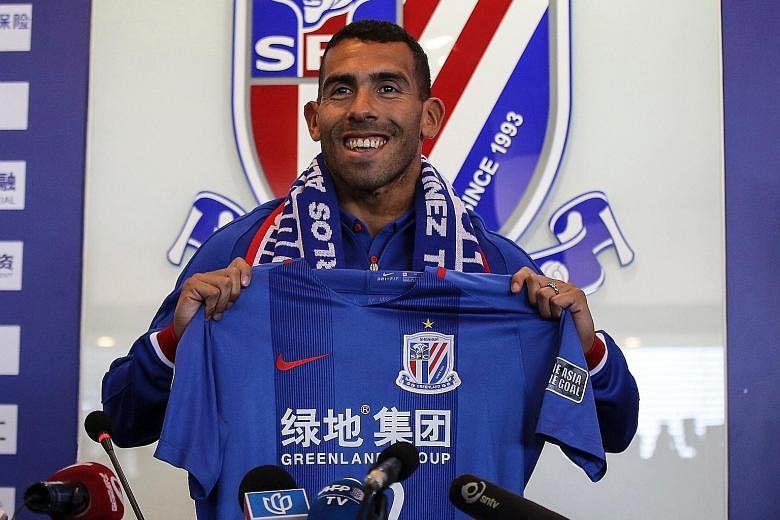SHANGHAI • A chance encounter in the first-class lounge of a New York-bound cruise liner in 2011 led former property banker Alex Jarvis straight into China's football boom.
Within three months, the Briton was in Chongqing on a deal. First it was a property; soon after that, a football transaction.
Another former financier, Harry Spencer, said he stumbled on China's football mania when he met people while playing bridge.
As Chinese businesses splurge on the beautiful game, Jarvis and Spencer are among a growing number of nimble middlemen cutting deals and making introductions.
The frenzy shows little sign of cooling despite caution from the Chinese authorities, who moved to limit the number of foreign players and introduce a salary cap.
Yet amid the spending spree, there are also risks that little- known buyers are unable to complete deals or will walk away without paying commissions.
Jarvis introduced English club Hull City's owners to Chinese businessman Chien Lee, the co-founder of hotel group 7 Days Inn, who also led a consortium in the takeover of French outfit Nice last year.
He said: "Two years ago, I could count direct competitors who could deliver deals on two hands. Now, it is thousands of them."
Chinese entities and individuals have ploughed more than US$3 billion (S$4.27 billion) into overseas football investments over the past year or so - a boon for cash- strapped clubs, but also for advisers like Jarvis, who have carved a niche connecting Chinese cash with Europe's clubs.
Investment bankers, usually the first in line to orchestrate deals, have remained out of the spotlight, wary of damage to their reputations and income if deals blow up.
Several bankers also said buyers are often untested and pay in cash, meaning there is little in the way of lucrative financing to be arranged.
"Who is representing some of the buyers? Is anyone telling them they are overpaying?" added a top sports banker who asked not to be named. "These are small agents who have no interest in the long term."
Not that Jarvis and his fellow fixers mind. "You don't have to be JP Morgan or Rothschild to do a deal in China any more," he said.
He added that the commission is typically a few per cent of the price tag. He usually seeks to be paid by the seller, rather than the Chinese buyer. It is new-frontier behaviour.
"There's going to be a lot of money made and a lot of money lost, for sure. It's a bit of a Wild West," said Peter Kenyon, former chief executive of Chelsea and Manchester United, now director of consultancy Opto Advisers.
Kenyon also has close ties to Spanish club Atletico Madrid, part-owned by China's richest man Wang Jianlin, and said he was now involved in other Chinese football deals in Europe.
The middlemen say the weaker pound has made English clubs more attractive for Chinese purchasers, so there should be more deals this year, after 2016 saw sales of West Bromwich Albion and Wolverhampton Wanderers to Chinese buyers. No deal for Hull has yet been completed.
Money is being spent in China too, where entrepreneurs have been encouraged by avid football fan President Xi Jinping. China aims to grow its domestic sports market to five trillion yuan (S$1 trillion) by 2025, about five times its current size.
Fuelling the deals are also the boasting rights from buying a club and top players. In recent weeks, Shanghai's two clubs have signed South American stars Carlos Tevez and Oscar, putting both among the best-paid players globally.
UK media reports put Tevez' salary at £615,000 (S$1.1 million) a week. There could be further deals in the next few days before the English Premier League's winter player transfer window closes on Tuesday.
After all, China wants to host and win the World Cup but is currently only No. 81 in Fifa's rankings, below sporting minnows like Curacao and the tiny island nation of St Kitts & Nevis, with a population of just 56,000 people.
The national team coach, Gao Hongbo, resigned last October after defeats to Uzbekistan and Syria left a bid to qualify for the 2018 World Cup in tatters.
Italian Marcello Lippi has since been installed as coach to revive the team's fortunes.
But while the opportunities are there, so too are the risks. Middlemen like Jarvis say they are convinced a deal will eventually go badly wrong.
"Just think of it as pass-the-parcel with a grenade. Someone is going to get blown up," he said.
REUTERS

